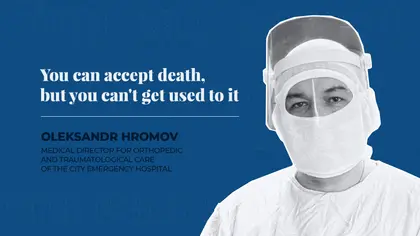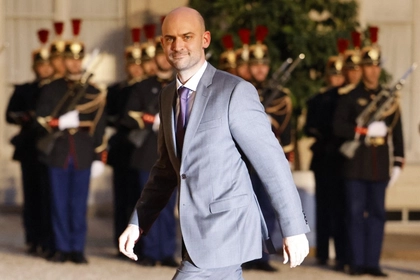Not all heroes carry weapons. In fact, 24/7 doctors on the front lines fight for the lives of Ukrainians and contribute immeasurably to the counteroffensive. Now more than 95 percent of Ukrainian citizens trust the soldiers of the Armed Forces of Ukraine. Following Russia’s full-scale invasion, the fates of Ukraine’s defenders rest with the doctors, nurses, and medical care providers who fight without guns or bullets.
To learn about the work of doctors in wartime, Kyiv Post spoke with Oleksandr Hromov, the medical director for orthopedic and trauma care at the Kamianske Emergency Hospital.
JOIN US ON TELEGRAM
Follow our coverage of the war on the @Kyivpost_official.
During the conversation, Hromov revealed the internal workings of the hospital and its medical care system. He talked about adapting from a peacetime emergency hospital to a wartime trauma center, now saving countless soldiers’ lives.
Was it difficult to adapt from civilian operations to military ones? How quickly did you manage to resolve any new organizational issues?
Since we are a City Emergency Hospital, all types of emergency cases were sent to us all along. That is, we’ve always had victims of accidents, explosions, burns, and even gun fights. So, we can’t say that we weren’t ready.
Our hospital has departments of traumatology, polytrauma, neurosurgery, burns, intensive care, surgery, gynecology, cardiology and rehabilitation. As well as a round-the-clock emergency room.
![[VIDEOS] North Korean Troops in Russia Confirmed](https://static.kyivpost.com/storage/2024/10/19/a6f6a4c5d74d066019e5812a20c6514f.png?w=420&q=75&f=webp)
[VIDEOS] North Korean Troops in Russia Confirmed
When the Russian invaders began to surround Mykolaiv in the first weeks, we knew that dozens and hundreds of wounded people would be brought to us.
But we didn’t have enough medicine, antibiotics, analgesics, dressings, casts and splints for fractures, etc. After all, we were equipped for the usual traumas of normal civilian life.
With the war footing switch, the most critical and immediate concern was finding resources. We searched everywhere.
For example, I called a classmate from the Czech Republic, and he helped obtain devices for gunshot wound treatment. We got help from other countries as well as from local volunteers.
For the first few days, the wounded soldiers individually came to us from the front. But later they began to bring 70 wounded a day.
All the hospital staff stayed in their jobs. We allocated patients to each department and doctors, conducting triage right at the hospital entrance. We were treating not just injuries but also chronic illnesses that had worsened during the war.
Can you compare the number of military personnel brought in for treatment now to how many there were before the full-scale war?
We don’t share this information publicly.
A month ago when a rocket hit a hospital with military personnel in Dnipro, there were accusations against those who published the information on the internet because the posts jeopardized the safety and security needs of military hospitals. Some suggest that this information could be a tip-off for the Russians.
What does your schedule look like and can you tell us the approximate number of operations per day?
There are operations taking place every day, many of them urgent. The staff of our hospital is large and works around the clock. We also have several operational teams that work simultaneously.
In addition, it all depends on the duration of the operation. They could last either half an hour or four.
For example, you could remove a fragment from the body of a fighter in about ten minutes. Or you might search for two hours and not find it, because it’s deeply embedded.
Such is our role right now. Everyone works hard and gets home late. From the CEO to the junior nurse, everyone performs their duties and contributes to our victory.
What are the most common military injuries?
Mostly, they are admitted with shrapnel wounds to the limbs.
But many people think that military personnel are admitted to the hospital only with injuries received in battle. However, many fighters come to us after car accidents or non-combat injuries, for example, a soldier has a fracture because he ran somewhere and fell.
Also, under battlefield conditions chronic illnesses may get worse or a soldier’s general health simply deteriorates.
After treatment, the fighters are discharged and return to the front. Many of them are eager to return to action as soon as possible.
We had just removed shell fragments from one soldier and prescribed some rehabilitation. He said: “No, I need to go back to the front, to my men. They can’t cope without me.” He left the very next day.
Which operation do you remember the most?
It was one of the very first operations. A young volunteer went to Avdiivka, where he was shot by Kadyrovites (Chechen forces assigned to the Russian military). He had a severe hip fracture from the gunshot wounds.
We used a new device that we got from the Czech Republic. It was a difficult turning point in our procedures and a fundamentally new system for us. But, thankfully, everything went well and he recovered.
War and its consequences cause massive upheavals, especially in the medical profession. How do you feel about this as a surgeon?
At first, we just reacted to everything emotionally. But over time, you get used to most of it. Nevertheless, it’s difficult for any normal person to cope with death, and it doesn’t matter whether it’s a soldier or a civilian.
As they say, every death is a tragedy, and a million deaths are statistics. However, each case is very difficult to experience. You can accept death, but you can't get used to it. It’s always a tragedy.
Does the hospital have enough medicines and equipment?
We have two big priorities. The first is medications: the hospital constantly needs analgesics, i.e., painkillers, as well as antibiotics and anticoagulants, drugs used to prevent thrombosis.
The second is newer technology: we urgently need electrosurgery devices to help stop bleeding during operations to save soldiers’ lives.
You can also highlight the text and press Ctrl + Enter






